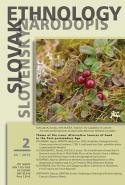The Turn into Dangerous Meat: Case Study of Horsemeat Food Fraud in the Czech Republic
The Turn into Dangerous Meat: Case Study of Horsemeat Food Fraud in the Czech Republic
Author(s): Eva KotaškováSubject(s): Agriculture, Health and medicine and law, Family and social welfare, Sociology of Politics
Published by: Ústav etnológie a sociálnej antropológie Slovenskej akadémie vied
Keywords: food fraud; food waste; dangerous meat; STS; standards; classifications;
Summary/Abstract: The aim of this article is to analyze context and strategies to decrease the alternative use of safe food product that does not fit into the market system. This process is revealed in a case study of a horse meat food fraud in the Czech Republic that took place in 2013. Unlike many other European countries, in the Czech Republic food products containing undeclared horse meat were not given to charities or used as a source of fuel but were classified as dangerous and thus turned to a category of non-edible food. How can we understand this way of processing and what can this case say about attitudes towards classification of food? Following a story of products containing undeclared horse meat, a network of context and strategies that are relevant in this case is developed. The analysis is inspired by Science and Technology Studies, mainly the study of classification and standards. The horse meat case shows that categories of waste and food are consequences of depoliticization of politics, market regulation, technologies, and understanding of objects. Together with various strategies of decreasing the possibilities to negotiate leads to preservation of prevailing standards and classifications.
Journal: Slovenský národopis
- Issue Year: 64/2016
- Issue No: 2
- Page Range: 179-191
- Page Count: 13
- Language: English

